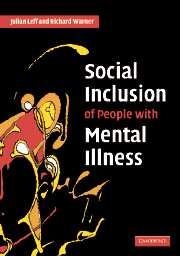Book contents
- Frontmatter
- Contents
- Preface
- 1 Introduction: barriers to social and occupational integration
- Part I The origins of stigma
- 2 The course of psychoses
- 3 The nature of stigma
- 4 Poverty and social disadvantage
- 5 Ameliorating users' symptoms
- 6 Dismantling psychiatric institutions
- 7 Reducing fear and discrimination among the public
- 8 Tackling self-stigmatisation
- Part II Overcoming obstacles to employment
- References
- Index
8 - Tackling self-stigmatisation
from Part I - The origins of stigma
Published online by Cambridge University Press: 24 October 2009
- Frontmatter
- Contents
- Preface
- 1 Introduction: barriers to social and occupational integration
- Part I The origins of stigma
- 2 The course of psychoses
- 3 The nature of stigma
- 4 Poverty and social disadvantage
- 5 Ameliorating users' symptoms
- 6 Dismantling psychiatric institutions
- 7 Reducing fear and discrimination among the public
- 8 Tackling self-stigmatisation
- Part II Overcoming obstacles to employment
- References
- Index
Summary
Normalising unusual experiences
We have discussed the response of users to discrimination and stigmatising attitudes (section 3.7). A small minority of users speak out about their experiences and act as champions for their cause. The great majority, however, react by withdrawal and concealment, isolating themselves from possible sources of help. The effect of isolation is to compound the user's sense of being uniquely abnormal. In fact, the hallucinatory experiences of users suffering from psychoses are by no means unique. It has been known for many decades that around one half of people who have lost a loved one see, hear or feel the deceased person, sometimes for years after the loss (Rees, 1971). Rees pointed out that bereaved people are very reluctant to talk about these experiences for fear of being thought ‘mad’, and none of his informants had revealed them to a doctor. More recently, surveys of the general population enquiring about unusual perceptual experiences and beliefs have found that between 5% and 18% acknowledge isolated psychotic experiences that do not seem to bother them (van Os et al., 2000; Johns et al., 2004). In support of these findings, an Internet survey of over 1000 members of the public that was focused on paranoia revealed that between 10% and 20% of the respondents held paranoid ideation with strong conviction and significant distress (Freeman et al., 2005).
- Type
- Chapter
- Information
- Social Inclusion of People with Mental Illness , pp. 87 - 98Publisher: Cambridge University PressPrint publication year: 2006

